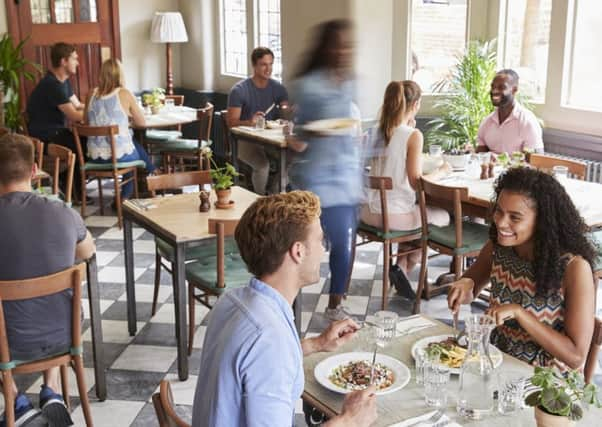Scotland needs calorie caps on restaurant meals - Jane Bradley


We all know that when we eat “out of home”, we, quite frankly, have no idea what is going into our bodies.
Meals bought from restaurants or cafes are a lottery when it comes to how many calories we are taking in, whether the food is high in fat, sugar or salt - or if it contains anything which will actually give us nutritional benefit.
Advertisement
Hide AdAdvertisement
Hide AdThis week, Food Standards Scotland (FSS) launched a consultation into “out of home eating” - warning that many meals on sale in Scotland to hungry consumers are far too large, high in calories and do not include enough of the good stuff - such as fruit, vegetables, beans and pulses.
It hopes to elicit responses from stakeholders who are restaurant owners, public sector officials and food manufacturers, to see how improvements could work. What they are asking people to consider is fairly drastic, including plans to limit the amount of calories a meal could contain, shrinking portion sizes and reducing the amount of the bad things in a typical serving. The plans would also mean that restaurants and cafes would have to list the nutritional values of items on the menu, listing calorie count; salt, fat and sugar content.
Ultimately, all of this would not only improve what is going into people’s stomachs, but it would encourage diners to start thinking about what they are actually eating.
Of course, there has been a growing trend in the last few years - mainly in higher-end restaurants, admittedly - of becoming knowledgeable about food provenance. We all love it when we find out that our meat has been grown in a local farm, or that the veggies and herbs have come from the restaurant garden out the back. It makes us feel like hunter-gatherers, that we are going back to our caveman roots. The difference is we’re now paying upwards of £30 for the privilege.
I have to say that I was mildly taken aback, but also macabrely fascinated, when, while in a restaurant on Edinburgh’s Dalry Road, I found on the menu a pork chop from Gorgie City Farm - which is practically next door. It wouldn’t have been so bad if I hadn’t recently been on a visit to the city farm with my daughter and watched as the cute little piggies wandered round. I wondered briefly whether the one destined for my plate was Poppy, Lola or Maisie - then, of course, I just ordered it - and it was delicious.
Yet, however few miles our food has travelled, that doesn’t make it necessarily healthier. Of course, a nice, fresh pork chop is better than a processed, frozen burger.
But restaurants often create meals which are indulgent - as that is what they are traditionally meant to be, a one-off, delicious treat, full of all of the naughty stuff that we shouldn’t eat at home.
As Food Standards Scotland points out, however, eating out is no longer an occasional treat. The average Scot now eats a meal “out of home” three or four times a week. Not necessarily dinner for most people - that would be extravagant - but more common is grabbing a croissant for breakfast on the way to work, which counts as eating out - as does your lunchtime soup and a sandwich from the work canteen.
Advertisement
Hide AdAdvertisement
Hide AdWhat we need is a cultural shift - and information is key to that.
When things become a cultural norm - such as bottomless soft drinks in restaurants in the US, officially the fattest nation in the world - they become socially acceptable.
If no-one - especially the state - does anything to try to give the message that something is not OK, we will go on doing it.
And that is the brilliance of the FSS proposals.
Any measures implemented by FSS or the Scottish Government will not be an instant fix for our obesity crisis. Of course it won’t. Yet it sends a message to people that eating unhealthily is not something which the state can endorse.
This has been shown to work in many other areas - such as the smoking ban, which was implemented north of the border in 2006. As a result - not just of the ban but of the gradual shift towards smoking becoming an unacceptable social habit - the proportion of Scots who indulge in cigarettes has fallen to 18 per cent today from 28 per cent fifteen years ago, according to figures from Ash Scotland.
Similarly, sugar, which in my childhood, was perceived as something which was only a problem if you were overweight, is now known to be actively detrimental to health. Health messages from government and the third sector, backed up by initiatives such as the soft drinks levy, have helped to hammer the reality home - and it is slowly beginning to get through.
Of course none of these things are going to be banned completely. Even cigarettes, which are known to cause dozens of diseases, including 15 cancers, are still legal and arguably, that’s how it should be - let people make up their own minds.
It is the government’s responsibility to ensure they are properly informed - but then it is up to the consumer to use that information. And that is what these FSS proposals are doing. Let’s back them all the way.
